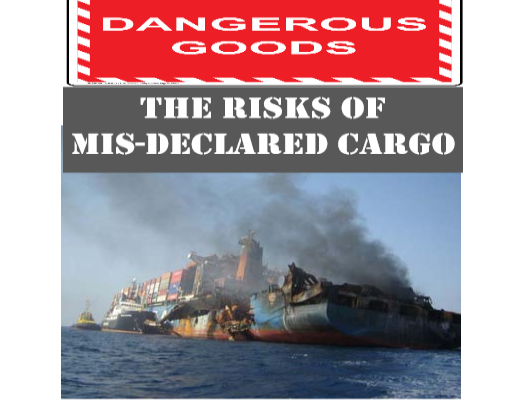Despite industry and government efforts, dangerous cargo that has not been declared, or that has been incorrectly declared or labelled, continues to cause fires and explosions, hurting and killing vessel crew and transportation staff. In response to this continued safety challenge the World Shipping Council (WSC) has issued a statement jointly from Washington, Singapore, Brussels, London, 28 September 2023 – announcing it is now taking additional action to strengthen cargo safety standards and protect the lives of the people working in the supply chain, the environment, and the integrity of the global supply network.
Containership fires have seen a disturbing rise over the past decade, with a notable number resulting in casualties and total losses. According to the 2023 Allianz Safety and Shipping Review, there have been 64 reported fires on containerships in the past five years. One of the key factors contributing to these fires is hazardous cargo that has not been declared, mis-declared or that has not been properly packed by shippers.
About 10% of 20ft containers being shipped annually are estimated to contain declared dangerous goods (DG). Of these, about 1.3M containers may be poorly packed or incorrectly identified, indicating the scale of potential risk.
Undeclared or mis-declared cargoes which have become notorious for causing container fires include calcium hypochlorite (widely used as a bleaching agent), lithium batteries and charcoal. Non-declaration or misdeclaration of cargoes is generally understood to arise from shippers’ attempts to pay lower freight rates or to circumvent restrictions on the carriage of dangerous cargoes.
According to global insurer Allianz, container ships today are carrying an incredible 1500% more containers than they were in the late 1960s. In just the last decade, the biggest vessels have almost doubled in size to 400 metres long.
These colossal container ships that make global business possible have become a dangerous fire risk. After years of lobbying, the Hamburg headquartered International Union of Marine Insurance (IUMI) and its supporters have managed to get this fire safety issue onto the agenda of the International Maritime Organisation (IMO).
Despite comprehensive and clear international and national regulations on the transport of dangerous goods, some goods loaded into containers continue to be mis-declared or not declared at all, which complicates detection, may result in ship fires and make firefighting much more challenging. Many vessels have inadequate firefighting systems on board. In 2022, fire-related incidents at sea surged by over 17% compared to the previous year.
Car carriers present particular risks, as with the notable Fremantle Highway fire off the Netherland’s coast. In that incident, an auto carrier with nearly 4,000 vehicles on board caught fire, resulting in one dead crew member and possibly hundreds of thousands in damage costs.
The WSC’s initiative that we mentioned at the start of this article, called the Cargo Safety Program, will rely on a digital solution made up of a Common Screening Tool, Verified Shipper Database, and a Database of Approved Container Inspection Companies.
The core function of the system will be to screen booking information against a comprehensive keyword library and risk algorithm. High-risk bookings will be flagged for further investigation and/or inspection, and lessons learned through experience will be used to continuously improve the screening tool. The emphasis is on identifying and correcting dangerous conditions before containers with dangerous cargoes are introduced into the supply chain.
Read our related article: Timely Reminders re Marine Insurance
As licensed Customs Brokers and International Freight Forwarders, Colless Young professionally handles all your sea cargo consignments, containerised and general. We provide import and export shipping, as well as airfreight, including customs and quarantine clearance, fumigation treatment, warehousing and trucking. We are based in Brisbane and offer a complete range of logistics services through all Australian ports and airports.

